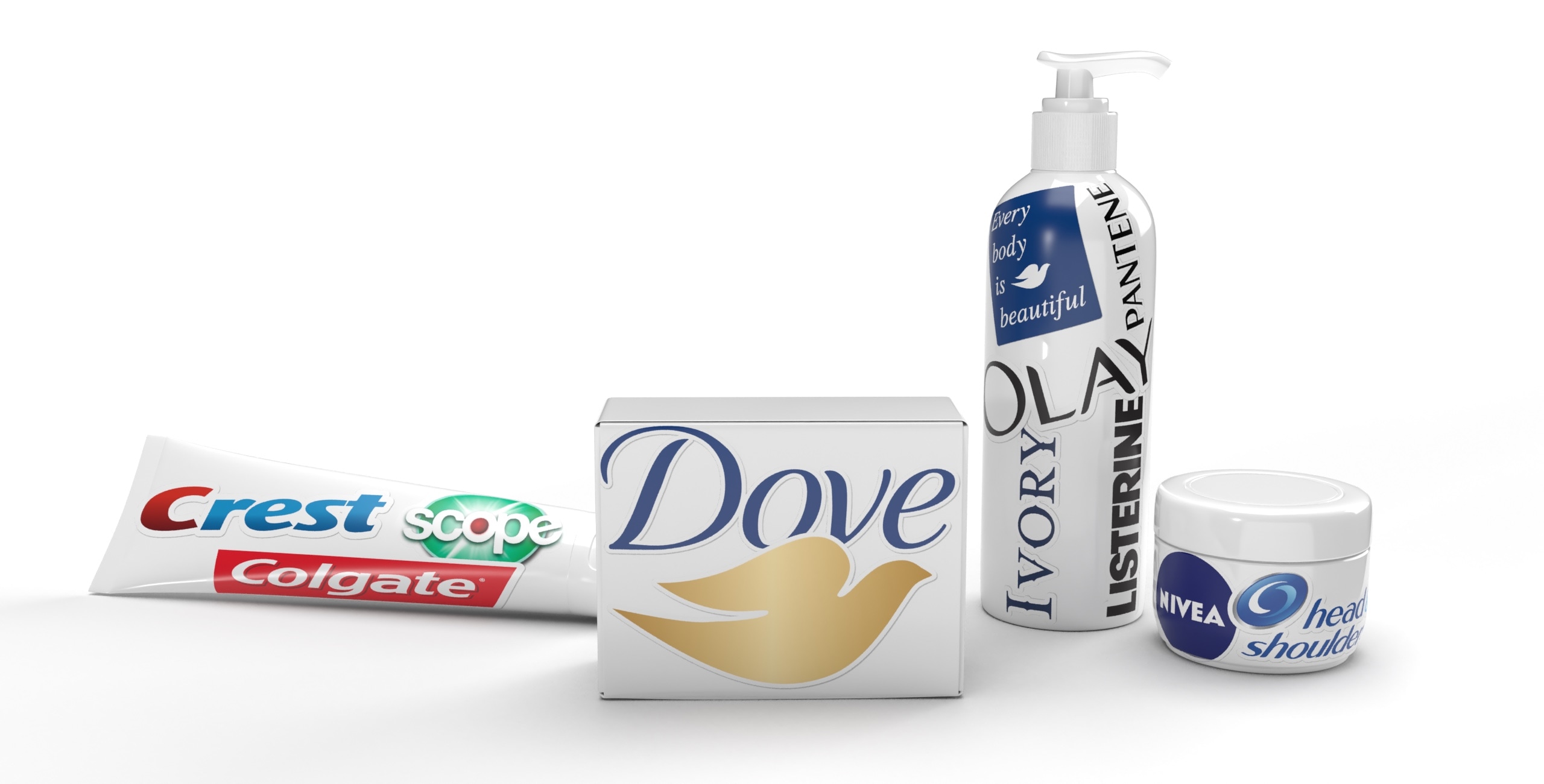Overview:
- The health & hygiene industry ranks 8th out of 15 industries for building Brand Intimacy.
- Dove has kept its #1 position. It is the top brand for millennials and those making under $100,000 a year.
- COVID-19 and the Black Lives Matter movement is impacting how Dove is communicating with consumers, as well as their marketing initiatives.
As the U.S. continues to struggle in the face of the COVID-19 pandemic, and important social issues related to diversity and racial justice are front and center, how brands are communicating and behaving is being transformed. Navigating these unprecedented times requires a willingness to convey emotion, awareness, and aid. We are sharing our insights into how brands can refocus, enhance, or optimize for today’s evolving marketplace.
For context, our annual study of intimate brands, the largest of its kind, launched on Valentine’s Day 2020 with research fielded in fall 2019. Because we are all facing the new reality of COVID-19 and societal debates on systemic racism, we are offering highlights of brand performance both before and after the pandemic and fight for racial justice emerged.
Before the crises, health & hygiene brands, established and ubiquitous, were maintaining the status quo while looking for new niche offerings to expand their portfolios. The category has ranked 8th out of 15 industries for the last several years in our Brand Intimacy Study, although it has improved its performance in terms of quotient scores the last two years.
Category Performance
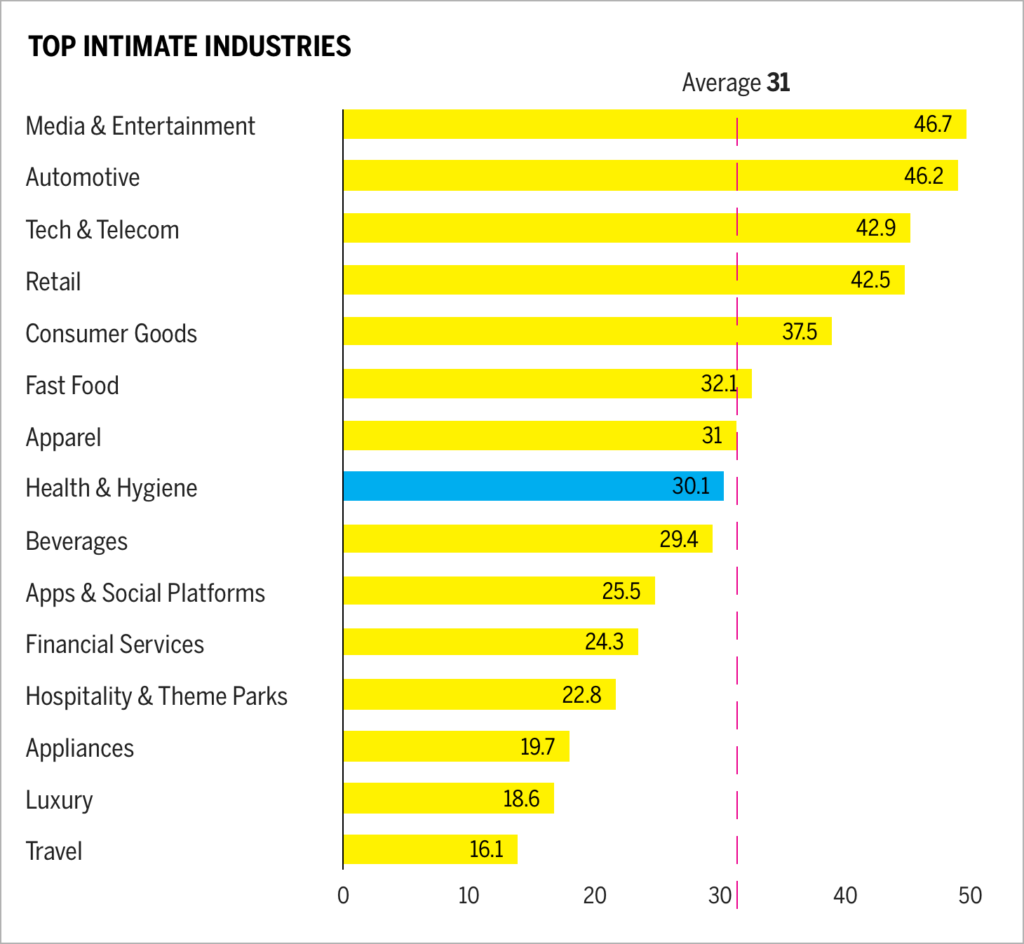
The health & hygiene industry ranked 8th out of 15 industries.
For the health & hygiene industry, ritual is the dominant archetype. This means that consumers see these products as part of their routine, and they are ingrained into their everyday lives. The category ranks 3rd out of 15 industries for ritual. Relatedly, the industry also comes in second for daily usage. Health & hygiene has shown improvement across all six Brand Intimacy archetypes, which are patterns or markers that are consistently present, in part or in whole, among intimate brands. Regarding the stages of intimacy, which measure the intensity of brand relationships, health & hygiene brands have improved their performance in sharing, the earliest stage of Brand Intimacy, and fusing, the most advanced stage, in which the user becomes co-identified with the brand.
Pandemic Impact
Like many industries, the health & hygiene industry has been impacted by COVID-19. Beauty and personal care sales are predicted to decline by their steepest rate in more than 60 years.1 McKinsey estimates global beauty-industry revenues could fall 20 to 30 percent this year and in the US, if there is a COVID-19 recurrence later in the year, the decline could be as much as 35 percent.2 On the other hand, sales of health products and medical supplies increased significantly, particularly during the beginning of the pandemic, up 85.3 percent from the previous year.3 Specific in-demand products like hand sanitizers and wipes show an online sales increase of over 5,000 percent compared to this time last year.4 Liquid hand soap sales rose 170 percent.5
Up Close With Dove
Dove has been the top health & hygiene brand for two years. Its quotient score declined this year (from 44.7 to 37.4), although it still remains the industry leader. The brand did increase its quotient score with millennials, up from 44.7 to 46.3. The brand also improved its performance across a few other notable measures. First, it increased its percent of users in sharing, the earliest stage of Brand Intimacy from 13.5 percent in 2019 to 16 percent in 2020. The brand’s “can’t live without” score also rose significantly from 14 percent to 26 percent in 2020. Last, consumers ability to form an “immediate emotional connection” with the brand increased from 40.5 to 47.7.
Dove has worked hard to differentiate itself from its competitors, marketing less around its products and more around consumers and emotional stories. Dove’s advertisements have encouraged consumers to find their own inner strength and recognize their own beauty. The company’s “No Digital Markup” pledge highlights their commitment to always portray women as they are in real life – and never using the manipulated, unachievable images of ‘perfect’ beauty created by image distortion. Further, Dove’s strategy to focus on celebrating the diversity and differences of its consumers has long been part of its storytelling focus.
How Dove Communicates in Today’s World
We’ve augmented our Brand Intimacy research (fielded in November 2019) with social listening research we captured (the week of June 22, 2020). We studied top intimate brands in the health & hygiene space including Dove, Olay, Ivory, (via P&G), Nivea, Crest and Colgate reviewing the communications on their website and inbound social. The analysis encompassed 61,778 words.
It is important to note that social listening data aren’t directly related to Brand Intimacy measures, although we hypothesize that the sentiment measured through the internet and social media will have an effect on future Brand Intimacy quotient scores and rankings.
Our topline findings:
Our review of the category finds that Dove is much more likely to talk about issues related to racial justice, celebrate the individual, and express concern about the mental health of its customers. The brand also addresses its contributions during the COVID-19 pandemic. Among brands reviewed, it has most significantly augmented its communications to address today’s new realities.
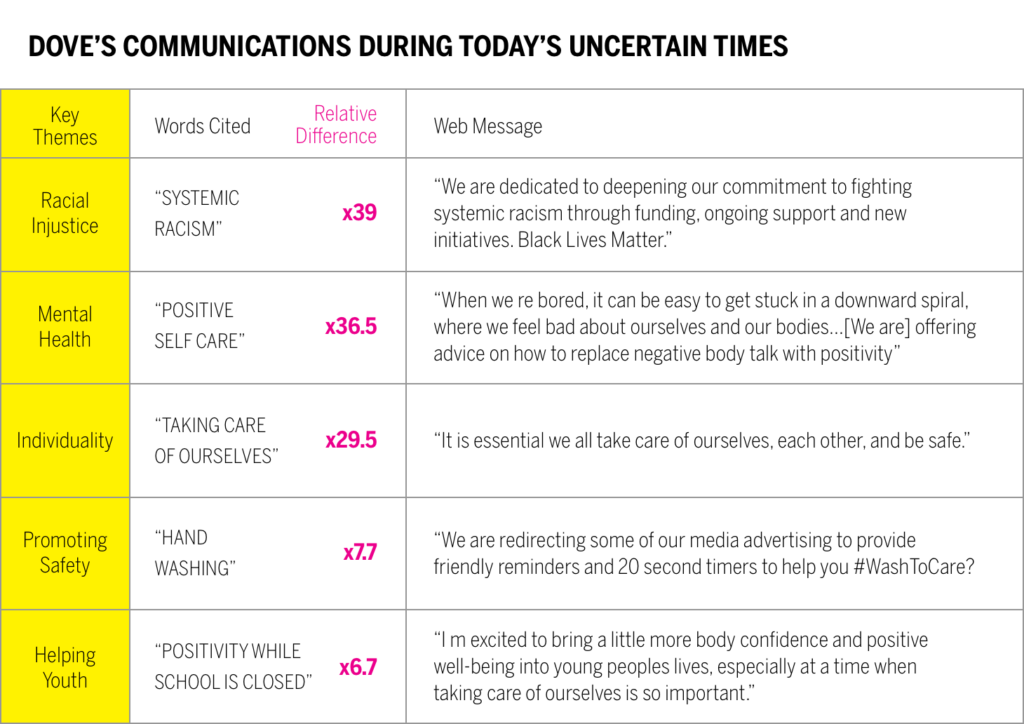
Different areas of focus for Dove.
This chart demonstrates a comparison of five of the most significant themes that Dove is featuring on its website and social presence.6 It shows context around each theme and a sample message found on their website. We are able to see the number of appearances of key themes and the relative difference based on the other brands reviewed (e.g., Dove speaks 29.5 times more about the importance of individuality and taking care of oneself in these trying times compared to the other brands in the category).
Dove’s five key themes: Racial Injustice, Mental Health, Individuality, Promoting Safety, and Helping Youth demonstrate their focus on promoting individual positivity, confidence, and care.
They are not providing detailed safety tips on hygiene for preventing COVID-19 or how to get children to wash their hands; rather the brand focuses more on emotional wellness. The brand speaks to its consumers in a familiar and friendly way and highlights the ways they are trying help. They are offering online resources for parents, teachers, and youth leaders including classes, articles, activities, and advice related to self-esteem. Dove has promoted frontline workers in advertising and discussed ensuring representation of people of color in all external promotions. They are also highlighting contributions to ending racism and expanding their CROWN coalition, originally founded to end discrimination toward black hair, now to a broader social agenda.
- Racial Injustice takes center stage. The brand’s pinned tweet7 highlights the tangible ways the brand is fighting systemic racism. Much of their communication also speaks to how the brand celebrates and respects diversity.
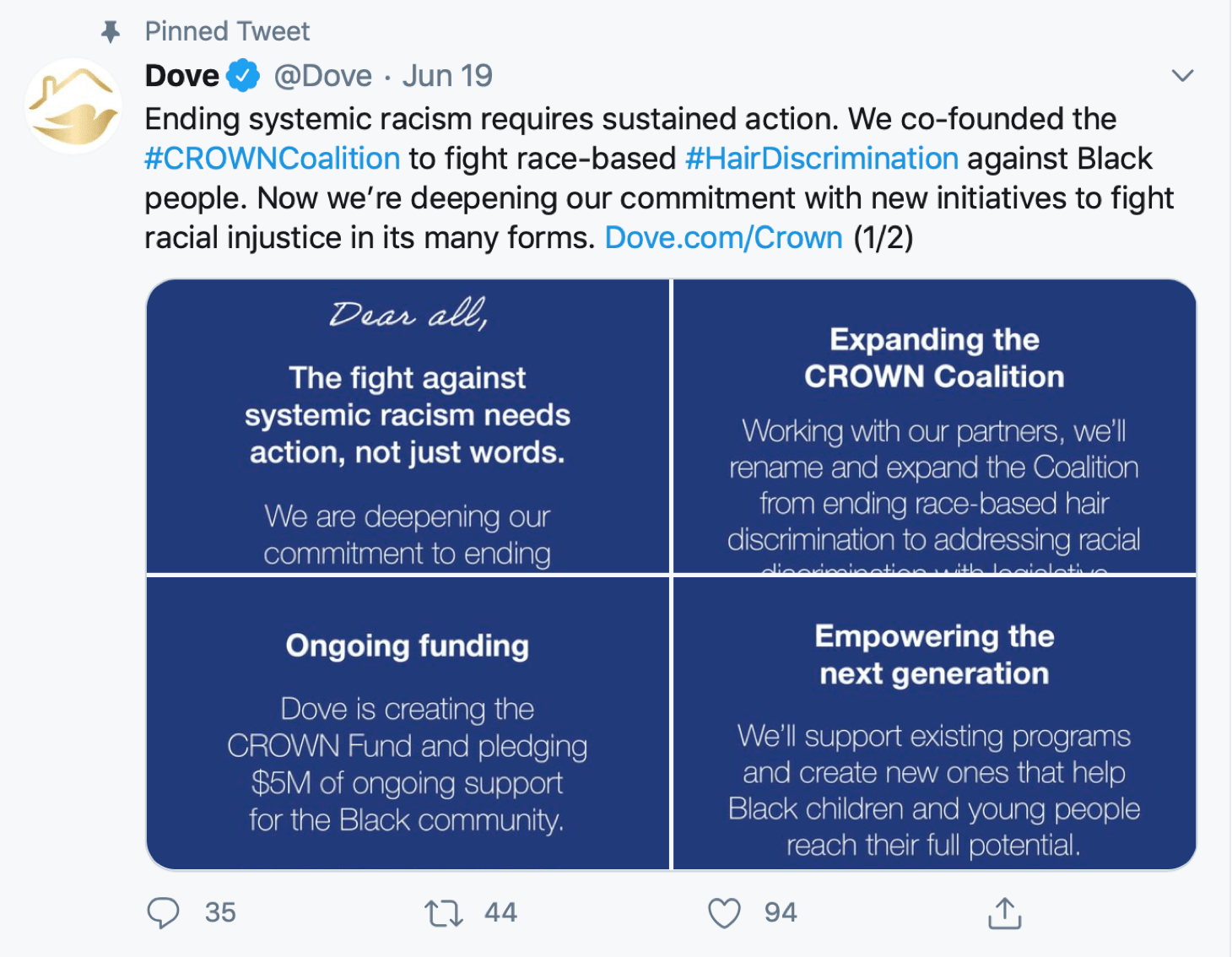
“We will increase the representation of Black voices both in front of and behind the camera. We will commit at least 25% of our US influencer budget towards Black content creators.”
- Mental Health demonstrates concern for peoples’ emotions during this time. The brand tries to lift people’s spirits and help maintain body confidence.
“Our first class offers simple ways to feel happier at home through a Five-a-Day well-being challenge.”
- Individuality highlights the importance of looking after yourself.
“It is essential we all take care of ourselves, each other, and be safe. That’s why you’ll see the Dove bird is flying to its temporary home to remind us to stay home if we can for those on the frontlines who can’t.”
- Promoting Safety speaks to the brand’s initiatives to redirect funds to promote hand washing and safe behaviors.
“As a brand that cares, we’re redirecting media investment behind some of our advertising to reinforce the WHO guidance on the importance of hand washing properly and frequently to care for yourself, your loved ones, and the world. It doesn’t matter which brand you use, you can wash with any soap, just remember to do it often.”
- Helping Youth addresses children being at home and provides some opportunities to engage in positive thinking.
“As the largest global provider of self-esteem education, the Dove Self-Esteem Project is helping parents, carers, and guardians support young people’s mental well-being at home while schools are closed.”
Dove is also donating its products to hospitals and health care centers as well as donating funds. They produced new advertising in light of the pandemic. It focuses on healthcare workers battling COVID-19, with the message “Courage Is Beautiful.”
Additionally, the brand is also rolling out ads to encourage hand-washing. One of their 30-second versions includes a countdown of the 20 seconds it takes to wash hands properly, with the message: “We don’t care which soap you use, we care that you care.”
Interestingly. Dove has also changed its logo during COVID-19. In addition to the message “Take care, be safe,” the brand has added a home above the dove, suggesting the dove is flying to its temporary home to remind us to stay home, if we can, for those on the frontlines who can’t. It is unclear how long this logo will be used, however, this is a very visible measure to acknowledge today’s unprecedented reality.
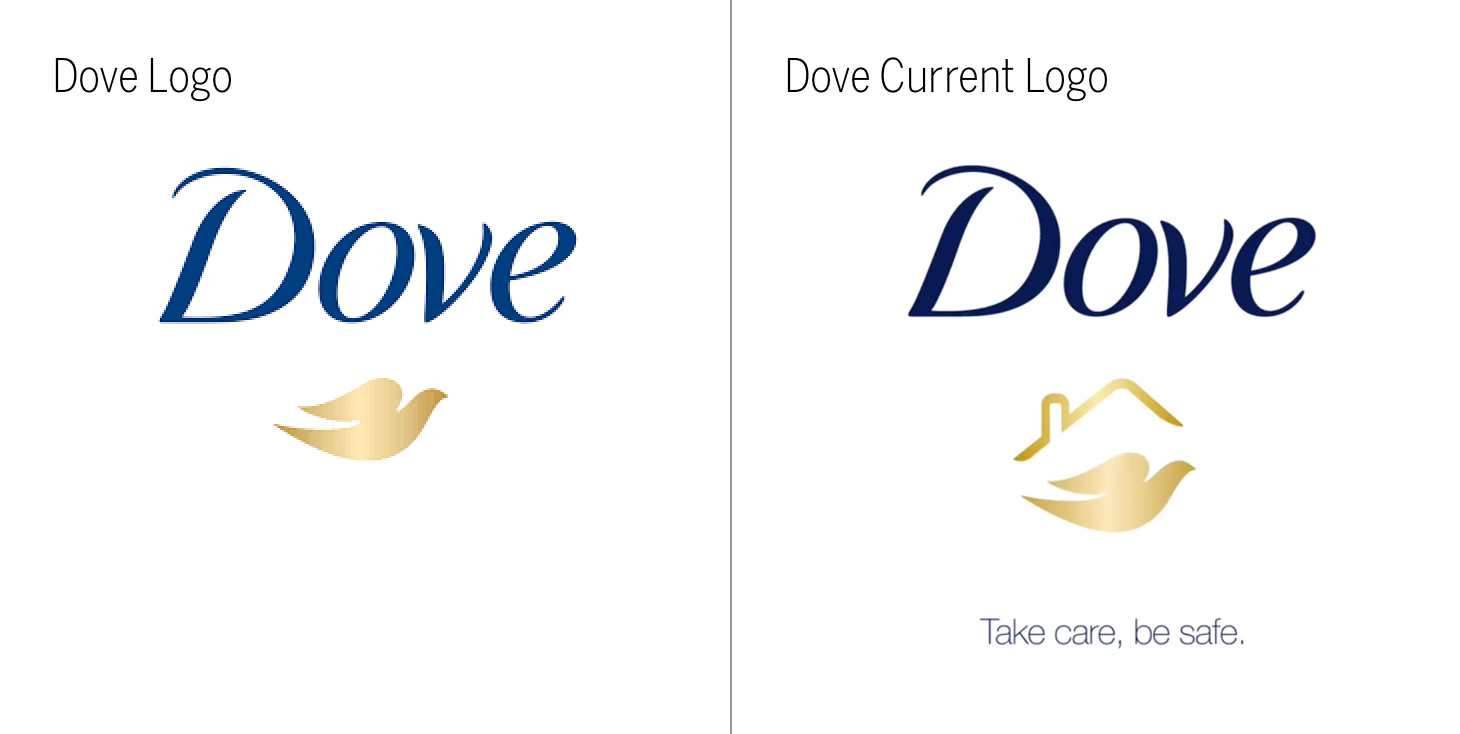
Conclusion: New Heights for Dove?
Volatility is dominant today, driven by both social unrest and continued COVID-19 outbreaks. Dove has firmly placed itself as supporting Black Lives Matter and contributing positivity and self-love to customers during this stressful time. It is promoting hand washing, and has chosen to change its logo to highlight the importance of staying home. As we return to “normal” life, it will be interesting to see if customers’ relationship with the brand will be strengthened or changed. Will our use of self-care products evolve? How will Dove choose to market post-pandemic? How strongly will they embrace systemic racism and how much do their consumers want to hear about this? Already centered on emotions and celebrating the real beauty within, Dove has demonstrated a commitment for continued emotional bonding during this time and in providing significant support and encouragement.
Read our detailed methodology here, and review the sources cited in this article here.
Check out our annual study and rankings of intimate brands. Visit our most recent rankings of intimate famous figures, BFF. Our Amazon best-selling book is available at all your favorite booksellers. Additionally, MBLM offers Custom Dashboards, providing extensive data for brands included in our annual Brand Intimacy Study. To learn more about our Agency, Lab, and Platform, visit mblm.com.
